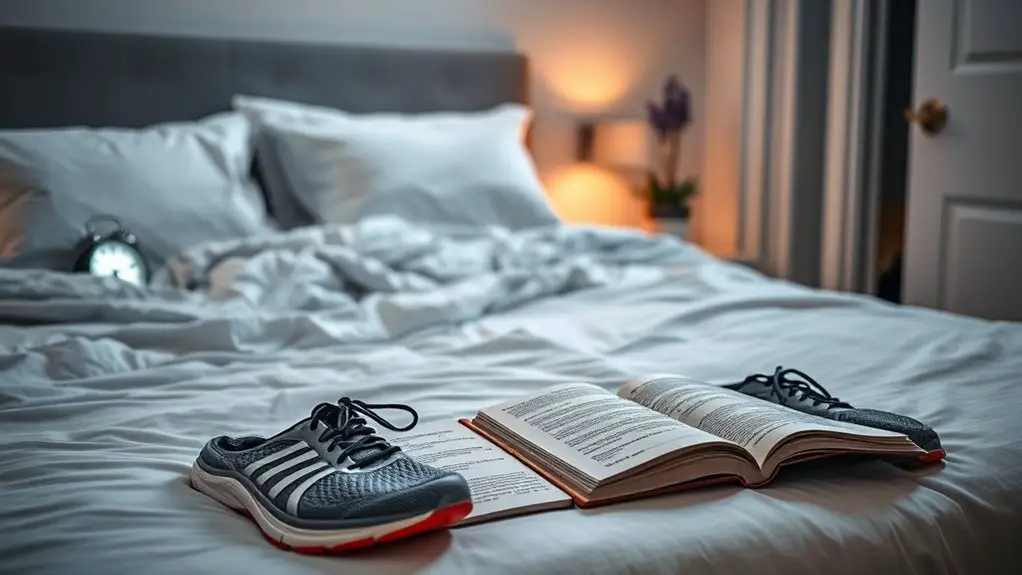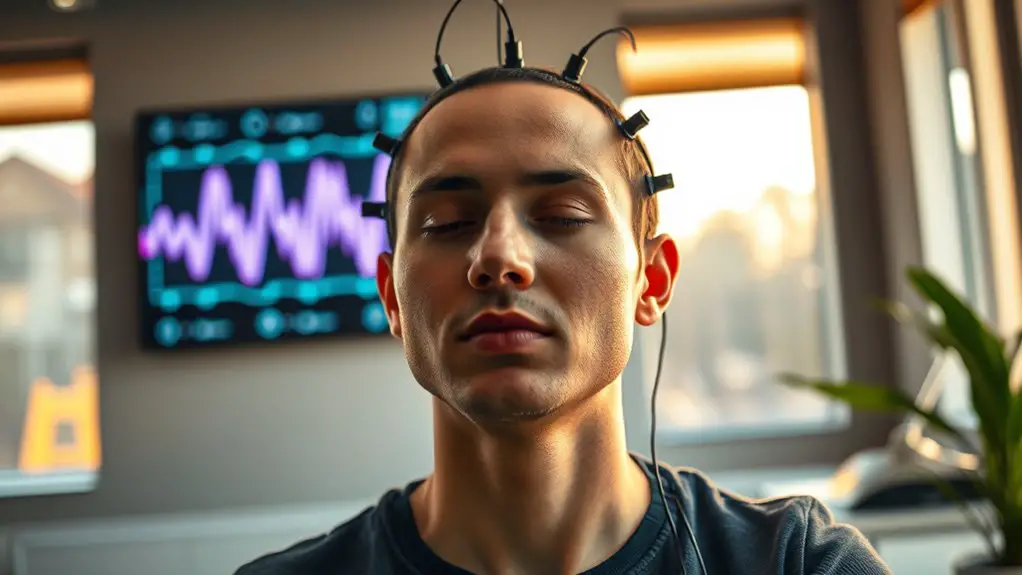To improve deep sleep as an athlete, establish a consistent sleep schedule and optimize your sleep environment. Incorporate relaxation techniques like mindful breathing and gentle stretching before bedtime. Monitor your nutrition and hydration, avoiding heavy meals and excessive hydration close to sleep. Limit caffeine and alcohol intake, especially in the afternoon and evening. Engaging in regular physical activity can also promote better sleep. There's more to explore on enhancing your sleep quality for peak performance.
Establish a Consistent Sleep Schedule
When you establish a consistent sleep schedule, you set your body's internal clock, making it easier to fall asleep and wake up refreshed. Embracing sleep consistency allows you to gain more control over your daily life, helping you rise and shine with energy. By going to bed and waking up at the same time each day, you'll feel more alert and ready to tackle your goals.
Incorporating bedtime rituals can also enhance your sleep experience. Think of activities that signal relaxation, like reading, meditating, or stretching. These rituals create a sense of freedom, allowing you to unwind from the day's stresses. When you prioritize sleep with consistency and dedicated rituals, you're not just improving your rest; you're investing in your overall well-being. Remember, better sleep leads to better performance, both on and off the field, so embrace this journey towards restful nights and energized days.
Optimize Your Sleep Environment
To get the best deep sleep, you need to optimize your sleep environment. Keeping your room at an ideal temperature and minimizing light and noise can make a big difference. These simple adjustments can help create a restful space that promotes recovery and performance.
Ideal Room Temperature
Finding the ideal room temperature can make a significant difference in the quality of your sleep. Most athletes thrive in cooler environments, so exploring your temperature preferences is key. Here are three effective cooling techniques to help you find your sweet spot:
- Thermostat Settings: Aim for a temperature between 60-67°F (15-19°C) for optimal sleep.
- Bedding Choices: Use breathable fabrics like cotton or linen that enhance airflow and wick moisture away.
- Ventilation: Open windows or use fans to create a revitalizing breeze, allowing you to feel more comfortable and relaxed.
Minimize Light and Noise
A peaceful sleep environment goes beyond just temperature; minimizing light and noise is essential for achieving restorative deep sleep. You need to create a sanctuary where distractions fade away. Start with light blocking curtains or shades to keep unwanted brightness at bay. Even the smallest light can disrupt your sleep cycle, so cover any electronic displays.
For noise, consider using soundproofing materials or a white noise machine to drown out disruptive sounds. This not only enhances your sleep quality but also supports your athletic recovery. Remember, a dark and quiet space allows your body to fully relax and rejuvenate. Embrace these changes, and you'll access the deep sleep you need to perform at your best.
Incorporate Relaxation Techniques
While it might seem challenging to wind down after a long day of training, incorporating relaxation techniques can greatly enhance your deep sleep quality. These methods not only help you unwind but also allow your body to recover more effectively. Here are three techniques to take into account:
Incorporating relaxation techniques can significantly improve your deep sleep quality and aid in recovery after intense training.
- Mindful Breathing: Spend a few minutes focusing on your breath. Inhale deeply through your nose, hold for a moment, then exhale slowly through your mouth. This helps calm your mind and body.
- Progressive Relaxation: Start from your toes and work your way up, tensing and then relaxing each muscle group. This technique releases tension and promotes a sense of overall relaxation.
- Gentle Stretching: Engage in light stretching or yoga before bed. It relaxes your muscles and clears your mind, preparing you for a restful night.
In addition to these techniques, ensuring you get adequate quality sleep is essential for muscle repair and overall recovery. With these techniques, you'll find it easier to drift into deep sleep and wake up feeling refreshed!
Monitor Nutrition and Hydration
To enhance your deep sleep, pay attention to when and what you eat. Timing your meals can greatly influence your body's ability to relax and recover overnight. Additionally, staying properly hydrated throughout the day can support better sleep quality, so make sure you're drinking enough water.
Timing of Meals
Proper timing of meals can greatly impact your deep sleep, especially as an athlete. If you want to maximize your rest and recovery, consider these meal timing strategies:
- Pre-Workout Fuel: Eat a balanced meal with carbs and protein 2-3 hours before training to support performance without causing discomfort.
- Post-Workout Recovery: Have a nutrient-dense meal within 30-60 minutes after exercise. Focus on meal composition—combine protein and carbs to replenish energy stores and aid muscle repair.
- Evening Eating: Avoid heavy meals close to bedtime. Aim to finish eating at least 2-3 hours before sleep to allow your body to digest, promoting deeper rest.
Hydration Strategies
Hydration plays an essential role in optimizing your deep sleep as an athlete. When you stay properly hydrated, you access hydration benefits like improved recovery and reduced fatigue. But it's not just about drinking water; hydration timing matters too. Aim to hydrate throughout the day rather than chugging a gallon right before bed, which could disrupt your sleep.
Consider incorporating electrolyte-rich fluids, especially after intense workouts, to maintain balance. You'll find that staying hydrated helps regulate your body temperature, promoting a more restful night. Listen to your body and adjust your intake based on your activity level and environment. By mastering your hydration strategies, you can pave the way for deeper, more restorative sleep, helping you perform at your best.
Limit Caffeine and Alcohol Intake
While many athletes rely on caffeine and alcohol for quick energy or relaxation, limiting their intake can greatly enhance deep sleep quality. Reducing these substances allows your body to unwind naturally, which is essential for recovery and performance. Here are three ways to manage your consumption:
- Swap out caffeine alternatives: Try herbal teas or decaf options in the afternoon and evening to avoid sleep disruption.
- Mind your evening drinks: If you enjoy a nightcap, consider non-alcoholic beverages. Alcohol effects can hinder the deep sleep cycle, leaving you groggy in the morning.
- Establish a cutoff time: Set a time, like 2 PM, to stop caffeine intake. This simple boundary helps your body feel more relaxed at bedtime.
Engage in Regular Physical Activity
Engaging in regular physical activity is essential for enhancing deep sleep, especially for athletes. By incorporating strength training and aerobic exercises into your routine, you can boost your physical endurance and optimize sports performance. Don't forget the cross training benefits—mixing different workouts keeps things exciting and reduces the risk of injury.
Workout timing is vital; aim to finish intense sessions at least a few hours before bedtime to let your body wind down. Recovery workouts are just as important; they help with active recovery and maintain flexibility through targeted flexibility training. Additionally, incorporating rest days into your training schedule is crucial for allowing your body to repair and rebuild, ultimately improving sleep quality.
Consider Sleep Tracking Tools
To maximize your deep sleep, consider incorporating sleep tracking tools into your routine. These tools can help you gain valuable insights into your sleep patterns and optimize your recovery. Here are three options to explore:
Incorporate sleep tracking tools to enhance your deep sleep and optimize recovery through valuable insights.
- Sleep Apps: These apps can provide in-depth data analysis, allowing you to monitor your sleep quality and duration. They often include personalized feedback to help you make adjustments.
- Wearable Devices: From smartwatches to fitness bands, these devices offer high tracking accuracy. They can track performance metrics like heart rate and movement during sleep, giving you a complete picture of your rest.
- Sleep Monitors: These dedicated tools can provide recovery insights and show how various factors impact your deep sleep, aiding you in fine-tuning your recovery strategy.
Frequently Asked Questions
How Does Stress Impact Deep Sleep Quality for Athletes?
Imagine your mind as a calm lake, but stress throws stones into it, rippling the surface and disrupting your deep sleep. When you're overwhelmed, your body can't relax, making it tough to reach those restorative sleep stages. You need effective stress management and relaxation techniques to restore that tranquility. By prioritizing calmness, you'll find the freedom to enjoy deeper, more rejuvenating sleep, allowing your body and mind to recover fully.
Can Napping During the Day Affect Nighttime Sleep?
Daytime napping can definitely affect your nighttime sleep. If you're napping too long or too late in the day, it might reduce your overall sleep duration at night. However, short naps can recharge you without hindering your nighttime rest. It's all about finding that balance. Listen to your body; if you feel groggy at night, consider adjusting your nap length or timing. You want to feel free and rested, not restless.
What Role Does Genetics Play in Sleep Patterns?
Have you ever wondered why some people seem to fall asleep effortlessly while others struggle? Genetics plays a significant role in your sleep patterns. Your genetic predisposition can influence how easily you enter deep sleep or how susceptible you are to sleep disorders. Understanding this can empower you to make choices that align with your unique biology, giving you the freedom to optimize your rest and reclaim your nights.
Are There Specific Supplements for Enhancing Deep Sleep?
When it comes to enhancing deep sleep, you might consider specific supplements like melatonin. A common dosage is around 1-3 mg, but it's best to see what works for you. Herbal remedies such as valerian root or chamomile can also promote relaxation. Just remember, everyone's body reacts differently, so listen to yours. Embracing these natural aids can help you find that freedom in restful nights. Sleep well, and enjoy the journey!
How Can Travel Affect an Athlete's Sleep Schedule?
Imagine stepping off a plane, your body still in one time zone while your mind's racing in another. That's the reality of jet lag, and it can wreak havoc on your sleep schedule. As an athlete, you need rest, but crossing time zones disrupts your circadian rhythms. You might find it hard to fall asleep or wake up at odd hours, leaving you feeling drained instead of free and energized.




